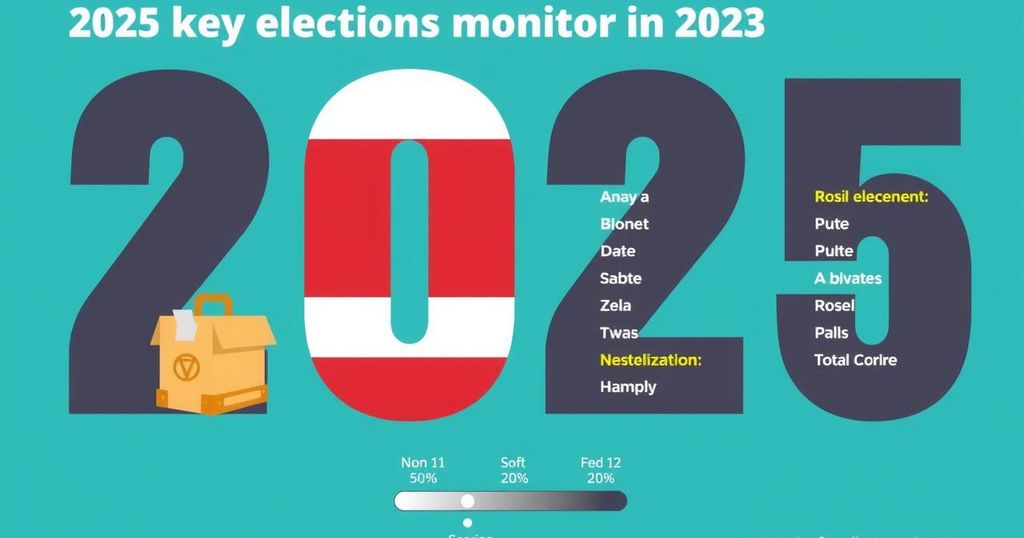Key Elections to Monitor in 2025: Insights from Five Key Nations

In 2025, five notable elections are anticipated across Belarus, Germany, the Philippines, Canada, and Chile, each marked by unique political challenges. Belarus continues under Lukashenko’s authoritarian rule, while Germany faces a coalition crisis. The Philippine elections will reflect President Marcos Jr.’s power, and Canada may see an early election amid Trudeau’s declining support. Chile’s election could signify a right-wing shift after significant political upheaval.
The electoral landscape in 2025 will feature significant elections in five nations, each grappling with complex issues. Belarus will see Alexander Lukashenko seek re-election in an environment devoid of genuine opposition, continuing his authoritarian grip since 1994. Germany faces a snap federal election due to a coalition collapse, with Chancellor Olaf Scholz battling economic stagnation and rising populist sentiments. The Philippines will hold midterm elections, which will serve as a referendum on President Ferdinand Marcos Jr.’s control amidst his contentious relationship with Vice President Sara Duterte. In Canada, Prime Minister Justin Trudeau could confront an early election amidst declining popularity and internal pressures, while Chile prepares for a presidential election with the potential for a right-wing resurgence after a period of political turbulence and constitutional challenges.
Belarus, on January 26, will conduct elections under the shadow of Lukashenko’s long-standing rule, with all nominal opposition figures expressing support for him, ensuring a continuation of his authoritarian policies. Germany’s February 23 election emerges from a coalition crisis, with Chancellor Scholz’s government struggling to manage economic and geopolitical pressures. Meanwhile, the Philippines’ May 12 elections are likely to reaffirm Marcos’s influence, making it critical to the power dynamics in light of a potentially contentious impeachment trial for Duterte. Canada’s anticipated election, likely before October 20, hinges on an unstable political coalition. Lastly, Chile’s November 16 presidential election, coupled with the possibility of a runoff in December, reveals deep-rooted political fractures and challenges, as the ruling coalition grapples with opposition resurgence amid rising crime concerns.
The year 2025 offers a significant electoral calendar that reflects broader themes of political stability, social unrest, economic hardship, and international dynamics. The implications of these elections could redefine governance, domestic policies, and international relationships in their respective countries. Experts indicate transformative shifts as these nations navigate their electoral futures. In these contexts, each election acts not merely as a routine exercise in democracy but as a critical juncture that may define the direction of each country for years to come.
The years leading to 2025 are critically shaped by a multitude of geopolitical and domestic issues impacting various nations. With 2024 witnessing numerous elections globally, the upcoming year presents a different context, focusing on five key countries: Belarus, Germany, the Philippines, Canada, and Chile. Each of these nations faces unique socio-political challenges that are deeply intertwined with issues such as economic stability, historical political tensions, and socio-economic reforms. The impact of global events, such as the ongoing war in Europe and rising populism, looms large over these elections, influencing voter sentiments and expectations.
The elections set for 2025 across Belarus, Germany, the Philippines, Canada, and Chile hold immense weight, reflecting broader socio-political and economic issues within each nation. With authoritarianism, coalition politics, and political dynasties at play, the outcomes may significantly impact governance and policy directions. These elections also signal the complexity of contemporary democratic practices as nations grapple with internal divisions and external pressures, making the upcoming electoral processes not just pivotal national moments, but crucial indicators of future governance and stability.
Original Source: theconversation.com







